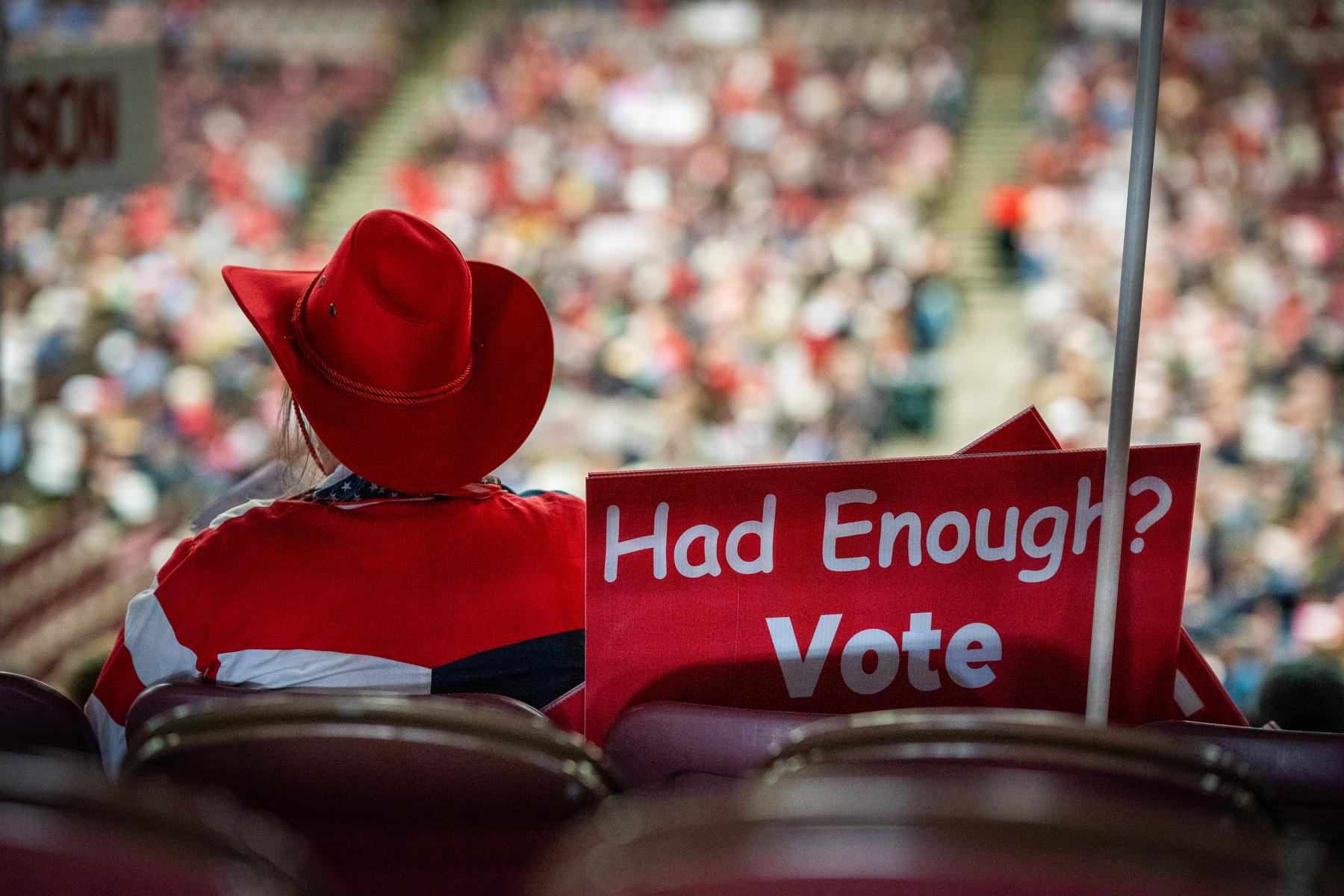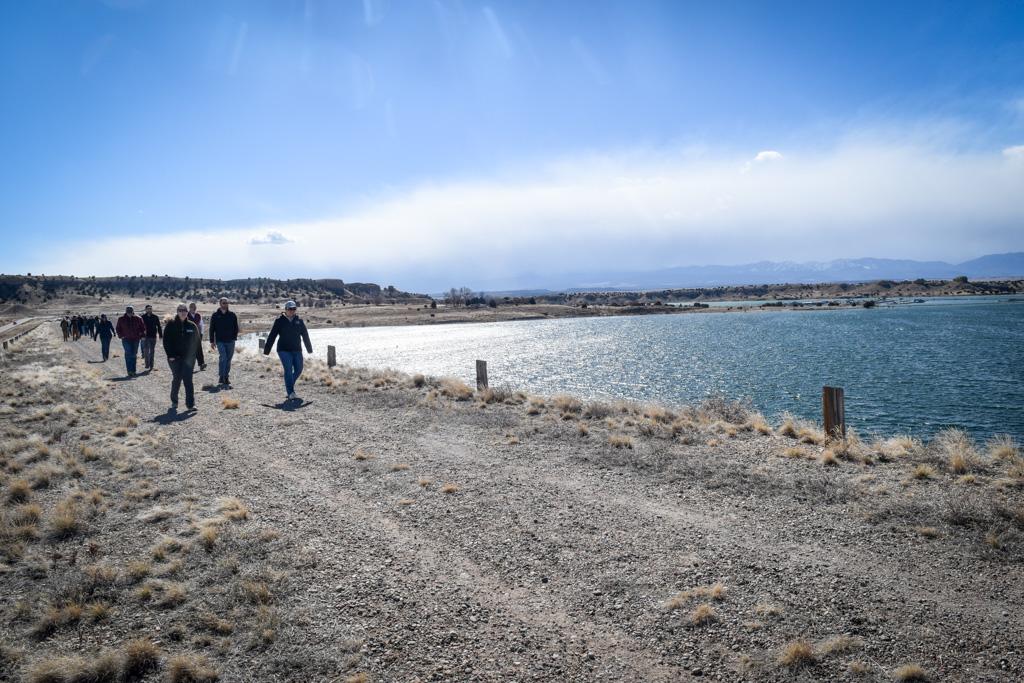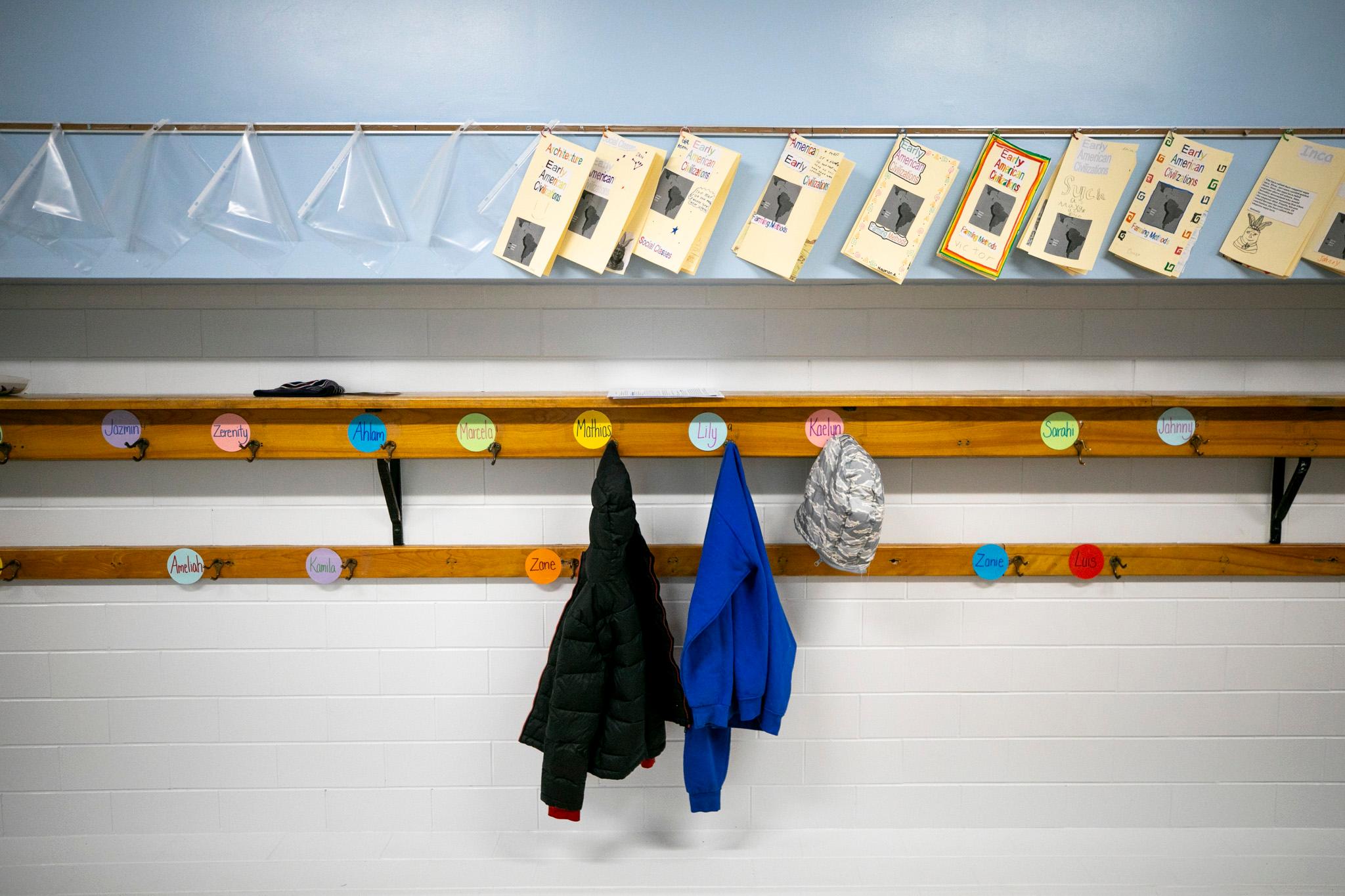
The next chair of the Colorado Republican faces a large to-do list, including mending fences within the party, raising money, and helping grow the GOP in a state that has trended strongly Democratic in recent years.
Current chair Dave Williams chose not to seek the office again after his single divisive first term, leaving the field open for a wide array of contenders, some of which defend his tenure and others who have strongly opposed it.
Members of the party's central committee will gather in Colorado Springs Saturday to make their selection from a field of six candidates.
Here’s who’s running:
Jeremy Goodall:
Goodall has been active in politics his whole life, starting with his childhood.
“My father was the pastor of the largest church in town, if not the regional area. And we became a pretty frequent campaign stop,” recalls the current Colorado Springs resident. “When you're the pastor's son, people go, ‘oh,’ they kind of view you as having some sort of clout.”
That involvement extended to joining the College Republicans, followed by internships with former Missouri Senators Kit Bond and John Ashcroft. After he moved to Colorado, Goodall said he became a local precinct chair in 2006. He has worked to get issues on the ballot, managed political campaigns and held various leadership positions within the party, including being elected to the State Executive Committee.
He is the owner and director of Pure Laugh Productions, an event and video production company and a founding board member of Protect Kids Colorado, an anti-trans rights parents rights group.
Goodall praised Williams for being in charge during last year’s election when the party picked up a few seats.
“It's been a constant complete erosion under all the previous chairs,” he noted. “Despite all of the fighting and name-calling and drama, the Republican Party actually managed to, I think, turn the corner. And my belief is we need to kind of continue that direction.”
But he said Williams stepping aside could bring people together.
“I think his exit has actually, very much in a self-sacrificing way, has opened the door to the possibility of actual healing.”
As chair, Goodall said he would continue to push to opt out of the state’s semi-open primary system, in which unaffiliated voters can cast ballots in party contests. He said that change has huge support among grassroots Republicans.
“If we're not going to listen to the wider body, how can we make any pretense of demanding unity?” he asked.
Goodall said another priority would be going on offense to create a vision for the party’s future and keep the momentum of the MAGA movement going.
“Are we the establishment or RINO side? Are we the guys that are power at any cost and will compromise core values to keep quiet on this issue because it doesn't sell well? Or are we folks that hold to our principles and values?”
Richard Holtorf:
The rancher and Army veteran from the Eastern Plains is a former state lawmaker, and previously ran for Congress, billing himself as a “no-nonsense conservative.”
Holtorf was first appointed to his House seat in 2019 and went on to be elected twice in the district. During his tenure he served as Minority Whip and sat on two committees: Agriculture, Water & Natural Resources and Public & Behavioral Health & Human Services. Much of his legislation focused on agricultural issues.
Holtorf’s tenure at the statehouse wasn’t always smooth. He dropped his handgun in a public area outside the House chamber and was reprimanded for using a racial slur during a heated discussion on the House floor in 2021.
Holtorf flew helicopters during two tours of Afghanistan. Currently, he manages his family’s Buffalo Springs Ranch in Washington County and proudly tells visitors that the earliest known record of the ranch dates back to 1892.
He did not respond to requests from CPR News to talk about why he is running for GOP Chair. He said previously that he supports the party’s efforts to close its primaries to unaffiliated voters.
Brita Horn:
A former Routt County Treasurer, Horn said if chosen as chair, she’d focus on electing more Republicans to office and growing the party in the state. And to do that she would prioritize fundraising. But her main vision for the Colorado GOP is unity.
“My message is let's get back to sanity,” she told CPR News. “Let's get back to working and doing the job that needs to be done again, which is elect more Republicans, grow the party, get some financial backing so we can get those done and, and start winning races.”
In an acknowledgment of the fractures in the party over the last two years, Horn said she’s been calling all 64 GOP county chairs “to figure out how we can get along” and what they need to succeed.
Like many of the candidates, she said under her leadership, the party would not endorse in any Republican primaries. She added she thinks the only voters in those contests should be registered Republicans, but she does not support the party acting on its own to go back to an assembly system, saying it would hurt the party in the long run with Republican-leaning unaffiliated voters.
Her view of the GOP is that it is a big tent party, saying if Donald Trump could get support from Robert Kennedy Jr., the Colorado Republican Party should also roll out the welcome mat.
When the group of dissenters tried to remove Williams last August, Horn threw her name in as a possible replacement. She and others involved, including another current candidate for chair, Kevin McCarney, are being sued by the Colorado GOP’s current leadership.
Horn called the lawsuit divisive and said it demonstrates the problem with the current leadership. Instead of engaging last summer to understand why members were unhappy with Williams’ leadership, she said, the party sought a temporary restraining order against its opponents instead. “That shows you the style of what we need to change.”
Shortly after announcing her candidacy, Horn rolled out a number of endorsements, including former gubernatorial candidate Heidi Ganahl and Colorado House Minority Whip Ryan Armagost.
Kevin McCarney:
McCarney sees himself as the outsider candidate in this race, despite having served as chair of the Mesa County GOP and previously running for state chair in 2022. He’s one of two candidates from the Western part of the state running to “get the party back in the right direction.”
For him that means returning to what he sees as the principles of the Republican Party: “smaller government, lower taxes, inclusion for people who want to be a part of this process.”
McCarney said it’s inclusion that sets him apart from the other candidates who, he said, “want as few people involved in elections as possible. And I think that’s the worst thing that we can do.”
He does not support excluding unaffiliated voters from Republican primaries, in part because he doesn’t think it can be done legally (the current system was adopted via ballot measure) or cheaply.
“I looked at what it would cost for Mesa County to run its own primary. It was between $250,000 and $400,000 just for our county. So multiply that by 10 other counties, you're talking about $5 million to run a private primary and we won't earn anything from that. What we will earn is a bunch of angry people who are unaffiliated who won't vote with us,” he explained.
Despite its congressional victory, McCarney said the state party missed an opportunity in 2024. When many other states saw Republicans make significant inroads, Colorado remained a relatively bright spot for the Democratic Party. He sees a winning coalition in bringing together long-time Republicans, legal immigrants who share their values and people dissatisfied with the Democrat party. “And we’ve made no effort to do that.”
This is McCarney’s second run for chair. He admitted he may be seen by party activists as a divisive candidate because of his involvement in last year’s fight to oust Williams. He too is currently being sued by the party for that effort.
Lori Saine:
Saine is a former Weld County Commissioner who also spent eight years in the Colorado House. During that time Saine chaired the audit committee and served in leadership as the Republican caucus chair. She was known as a strong advocate for Second Amendment rights and sponsored legislation to repeal Colorado’s ban on large capacity magazines, which failed multiple times.
Saine also touts the times she crossed the aisle to work on things like construction defects reform and legislation to make it easier for foster children to obtain a driver’s license. She’s also been involved with efforts to restore the historic Black settlement of Dearfield, Colorado.
Her top issue as chair, she said, is to opt the Republican Party out of the primary process that allows unaffiliated voters to participate.
“This is not about alienating other people who may vote for Republicans. This is simply returning the process back to what it was. And that's Republicans picking Republican candidates.” She said she wants the people’s voice to be heard.
“And what I found and others found across the state is that the further away you are from your base and your grassroots, the further you are away from the people.”
Saine said she would ensure the party remains neutral in primaries; “that's another friction point I'm looking to reduce.”
She is a strong critic of the effort to oust Williams last summer, calling it a “coup” and saying the “horrific timing” ahead of the election hampered the party to a degree.
“I think that really, really cobbled us when it came to picking up more seats in the (state) House.”
Saine also said she’d pledge not to run for elected office while chair — a departure from Williams, who ran for Congress last year — and do more to bring people into the inner workings of the party.
“Our bylaws require an audit, so I'm going to do an audit and I'm going to do quarterly statements so the people don't have to fight for financial statements. I think that party transparency is party efficiency, and that will certainly reduce some of the friction points.”
Darcy Schoening:
As Director of Special Initiatives, Schoening is the only candidate running who is currently involved in the leadership of the Colorado GOP.
“I've been leading the state, helping candidates, raising money, and fighting all the issues for years now, and I'm ready to step up and lead this party in the new Trump era,” she told CPR News.
As chair, she’d focus on building the party’s infrastructure, such as better data collection and analysis, and building a strong bench of candidates. She’d focus on local races in the short term, and use momentum and donor confidence built in those contests going into the 2026 election cycle.
“It's important to focus on those local elections — like the school board… city council people, county commissions -- that's who becomes our future state leaders, federal leaders.” She said she already has about $200,000 in donor commitments for the 2025 school board races.
Schoening said part of being a leader is learning from mistakes, like a state party email that attacked the idea of Pride Month and the decision to endorse in primaries. Schoening takes some responsibility for the endorsements, saying she led the party’s endorsement of Trump in the presidential primary and that led it to get involved down-ballot too, “which caused more issues than anything else.” She said she would not endorse in primaries again.
Still, she thinks the party’s faithful want aggressive leadership, and had Williams run again, she believes he would have won.
“The conservative grassroots Republicans… they want a more aggressive party. So we will still have an aggressive Colorado Republican Party that's at the forefront of most issues, but we will be more careful as far as how we communicate and how we manage candidates,” she explained.
Some issues that she thinks will resonate with Republican voters are election integrity and children and schools. “Education is going to be at the forefront of most people's issues because of the trans-ing of children that we've seen, especially in Colorado.”
Schoening thinks it will take some work to get the Colorado GOP to become a big tent party, but she said all Republicans are welcome and “there’s room for everybody.” Still, as part of the current leadership, Schoening served Horn with legal papers surrounding the party’s lawsuit against her when both women were guests on a local radio show.
The one caveat to that open-arms approach is allowing unaffiliated votes in the primary. Like most others running for the position, she said if unaffiliated voters want to take part in primaries, they need to register with the party. “We don't need your vote canceling out the vote of an actual Republican. So it's not a lot to ask to be a member of our party to vote in our party's primaries.”









